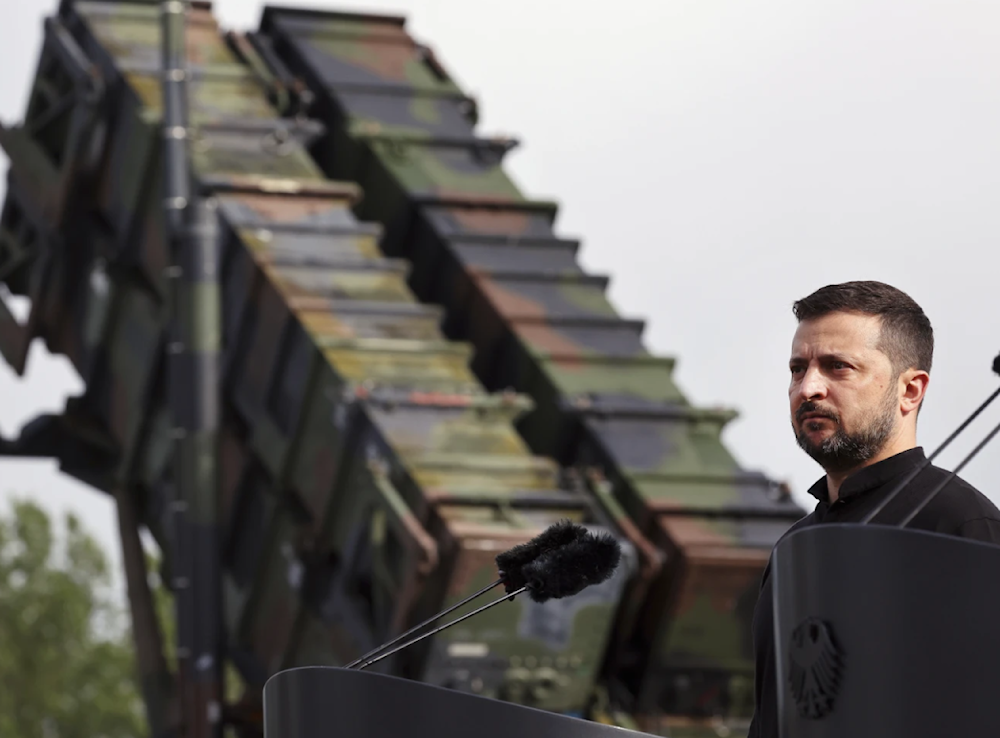Trump shifts arms strategy: Ukraine buys, allies replenish stocks
The Trump administration has fast-tracked Patriot missile deliveries to Germany, allowing it to transfer systems to Ukraine, as part of a broader shift toward arms sales over donations.
-

Ukraine's President Volodymyr Zelensky stands in front of a Patriot air defense missile system during a visit to a military training area in the German state of Western Pomerania on June 11, 2024 (AP)
The Trump administration has moved Germany ahead of Switzerland in receiving US-made Patriot air-defense systems, allowing Berlin to send two of its own to Ukraine, marking the first Pentagon-facilitated arms transfer to Ukraine under Trump.
The shift reflects both the urgent need to bolster Ukraine’s defenses amid escalating Russian advances and Trump’s push for NATO allies to share the financial burden.
A senior US official noted that as more countries agree to send Patriot systems from their own inventories to Ukraine, the administration will continue to reshuffle scheduled deliveries to prioritize those allies.
Further deals to release additional weapons for Ukraine are expected in the coming week. US Defense Secretary Pete Hegseth is set to hold a virtual meeting with NATO defense leaders on Monday to coordinate further support for Kiev.
The Swiss government confirmed that the US has chosen to reprioritize its Patriot deliveries as part of a broader effort to boost support for Ukraine. Switzerland had ordered five Patriot systems scheduled for delivery between 2026 and 2028, but that timeline is now uncertain.
Ukraine currently operates only a limited number of Patriot systems, provided by the US and other allies, and continues to call for more to defend against intensifying Russian missile and drone strikes. Each Patriot battery, manufactured by RTX (formerly Raytheon), includes multiple launchers, a radar, command and control units, and interceptor missiles.
Expanded NATO role, concerns over escalation
According to a senior US official, the Trump administration is pursuing one-on-one agreements with NATO members to purchase additional arms for Ukraine, with the Defense Department overseeing those negotiations.
The agreements will extend beyond Patriot systems to include a range of offensive and defensive weapons that NATO allies will supply to Ukraine and later replenish by purchasing replacements from the US.
Germany, Norway, Denmark, the Netherlands, Sweden, the UK, Canada, and Finland have already pledged support for the initiative, according to a NATO official. Other European nations are expected to join once the plan’s specifics are finalized, senior European officials said.
Timeline, a major concern
A major concern among US and European officials involved in logistics is the timeline for delivering these additional weapons to Ukraine. President Trump has given Russia a 50-day window to negotiate a peace deal or face severe tariffs and sanctions, including on trade. Analysts warn that Moscow is likely to escalate its military efforts before that deadline.
“Fifty days is too long to give Russia. They have shown no inclination to even negotiate in good faith,” said Mick Mulroy, a former Pentagon official and CIA officer. “They will do everything they can to advance in Ukraine over the next 50 days.”
On Monday, Defense Secretary Pete Hegseth hosted German Defense Minister Boris Pistorius at the Pentagon, with the Patriot deal high on the agenda. Trump, meanwhile, has characterized the arrangement as finalized. “They are coming in from Germany,” he told reporters on Tuesday.
German Chancellor Friedrich Merz announced that Ukraine would soon receive long-range missiles as part of the new Trump-led initiative, though he did not provide details. US Air Force Gen. Alexus Grynkewich, speaking in Germany, said he had been instructed to act swiftly and is exploring additional weapons to address Ukraine’s urgent needs.
Shift to sales model raises questions across Europe
A central shift in Trump’s approach is moving from donating weapons to selling them, a change he highlighted during a meeting with NATO Secretary-General Mark Rutte. “We’ve made a deal today where we are going to be sending them weapons and they are going to be paying for them. We, the United States, won’t be having any payment made,” Trump said.
However, European leaders are seeking clarity from Washington on what specific weapons and ammunition will be sent, how soon they’ll arrive, and whether there will be restrictions on their use, particularly in strikes inside Russian territory.
In response, Moscow issued a warning, with Foreign Ministry spokeswoman Maria Zakharova declaring that any country enabling Ukrainian attacks deep into Russia could see its own military infrastructure targeted. “In the event of further escalation of the conflict, we will respond decisively and with equivalent force," she stated.

 4 Min Read
4 Min Read










